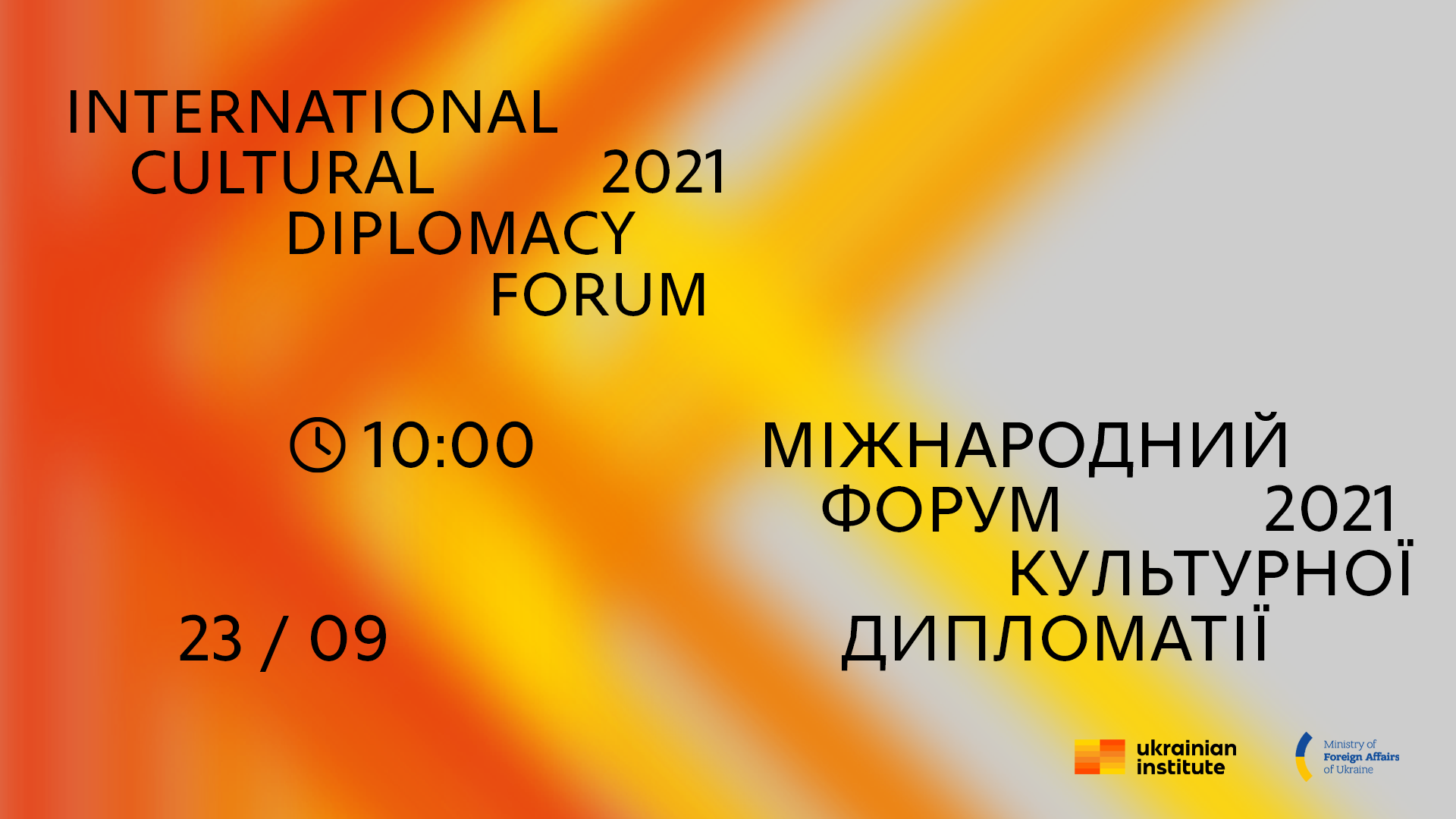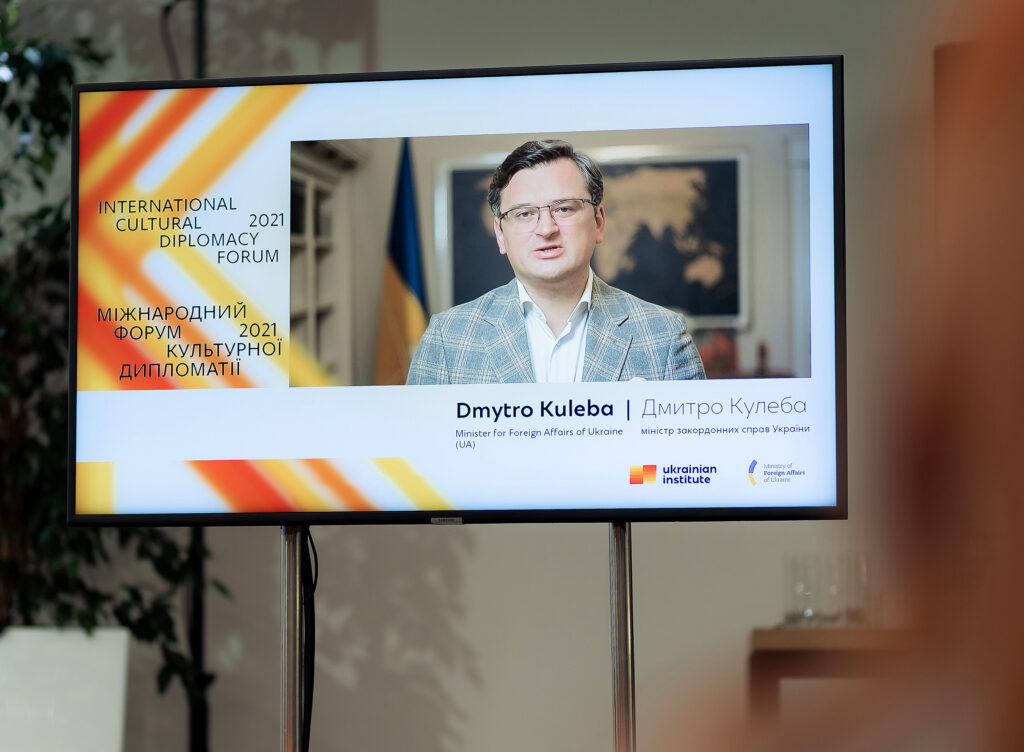
From human rights protection to misinformation: what was discussed at the International Cultural Diplomacy Forum 2021
On 23 September, the Ukrainian Institute in cooperation with the Ministry of Foreign Affairs of Ukraine organised the International Cultural Diplomacy Forum 2021 to discuss countries’ international representation through cultural diplomacy and cultural relations.
19 speakers from six countries – Ukraine, USA, United Kingdom, Bosnia and Herzegovina, Poland, and Germany —shared their experiences and brainstormed the new opportunities for international cultural relations in addressing global challenges. International Cultural Diplomacy Forum 2021 engaged cultural diplomacy practitioners, international journalists, scientists, and diplomats. The live stream was viewed by over 4 000 people from 15 countries.
This year the Forum encompassed various aspects of the cultural diplomacy: geopolitical processes in the world, human rights in conflict, misinformation, postcolonialism and gender equality.

Photo: Taras Bezpalyi
«Shaping and promoting a positive image of Ukraine in the world is one out of six key priorities of the foreign policy of Ukraine. The reputation of the country and its awareness abroad is more than a country’s brand. In the times of hybrid wars and misinformation, it is a matter of its national security. We work on changing the conception of Ukraine in the world, shaping and promoting the national brand by the means of soft power», — addressed Dmytro Kuleba, Minister for Foreign Affairs of Ukraine.
According to the minister, today there are four key tasks of cultural diplomacy in Ukraine: to defend its cultural and information sovereignty; to promote the added value that Ukraine creates for the world; strengthen understanding and trust in our state; to spread awareness about Ukraine as a country of new opportunities.
Photo: Taras Bezpalyi
Tetyana Filevska, Acting Director General at the Ukrainian Institute, stated that «although we are only at the beginning of the road and we will be able to observe great changes in a long time, today we can see how the interest in Ukraine is growing, cooperation in the field of culture between Ukraine and other countries is reviving. We move from short interventions to sustainable actions. We have a lot of ambitious challenges ahead of us to overcome. We are convinced that the forum is an important platform for discussing the future of cultural diplomacy».
Nicholas J. Cull, Professor of Public Diplomacy and Founding Director of the Master’s Program in Public Diplomacy at the University of Southern California spoke about culture as a territory of exchange between people and countries. As to Mr. Cull, cultural diplomacy brings results and opens the opportunity for any country to get on the international arena in cases when there is no balance of powers between countries: «Today small countries are the hostages of the bigger world, although they need to follow the same strategy — present themselves, prove to be perceived as equal and to have common interests with other countries. Some countries spend a lot of money to create a simple idea of who they are for the world. On the other hand, telling solely a story about yourself, emphasizing only your own, unique qualities, this story will not open opportunities for further cooperation».
The statement of Nicholas J. Cull supports the asymmetric approach of countries to foreign policy, offered with Ukraine’s example by Orysia Lutsevych, Head and Research Fellow, Ukraine Forum, Russia and Eurasia Programme at Chatham House: «Ukraine faces existential challenges from Russia that cannot be met only by diplomatic or military decisions. Ukraine needs a strong cultural component that works often as an asymmetric approach. Russia has a larger military capacity, has nuclear weapons, and is projecting a fairly serious soft power. Ukraine is still perceived as a sphere of influence of Russia. Separation from this is very important for Ukraine. In an unstable world, asymmetric responses through cultural means are a very effective tool».
«Ukraine is still pretty unknown region to Western Europe. It was disappearing under the roof of the Soviet Union. Also, there is little knowledge about Ukraine being a modern country — spoke Marieluise Beck, Co-Founder, and Director for East-Central and Eastern Europe of the Center for Liberal Modernity. — This is something which is really must be stressed and people must experience it. Going to Odesa, Lviv or Kyiv it is interesting to see how modern people live there, how wonderful cuisine is. Presenting your country, show more modern — fashion, music, literature, etc».
Photo: Taras Bezpalyi
«Decolonization processes include not only aesthetic or cultural recoding but also important economic and political processes. Decolonization does not happen in one moment, it continues. Colonialism leaves such a deep mark in culture, mentality, language, that rethinking and getting rid of these marks is a long process. Decolonization of Ukraine includes two elements: on the one hand, it is a rethinking of imperial codes, on the other — the Soviet past. Postcolonial issues are combined with post-totalitarian reality», — said Tamara Hundorova, Head of the Theory of Literature Department, Shevchenko Institute of Literature, NAS of Ukraine.
One of the aspects of the decolonisation processes is a state of relationships between centre and periphery, added Mayhill C. Fowler, a historian and associate professor in the Department of History at Stetson University: «When we talk about culture, what do we really mean? First of all, it is our worldview. When we talk about postcolonialism and the processes of decolonization, we should consider the relationship between the centre and the periphery. In the context of the Soviet experience, Moscow was clearly defined as a cultural centre. For Ukraine, the question is how to create new maps, new centres, new periphery. The challenge is to place yourself at the centre of history».
«National culture and its projection enable the creation of conditions for understanding and empathy. Public diplomacy is aimed, firstly, to inform for short-term advocacy. Secondly, the role of public diplomacy is to influence, to shape attitudes, perceptions about the country, its interests, and objectives. Cultural diplomacy creates the potential for influence. That provides context for external audiences to appreciate the challenges and the history that frame the way a country behaves in the global information space», — added Vivian S. Walker, Executive Director of the United States Advisory Commission on Public Diplomacy.
Current foreign policy stipulates that Ukraine is a proactive regional player and a contributor to the global problems solutions, — refers to the foreign policies and strategies Iryna Borovets, Acting Director at the Communications and Public Diplomacy Department, MFA of Ukraine: «Ukraine is not a victim and does not want to be represented solely as a victim of the Russian aggression. We would rather present to the world our added value in different areas. We think that added values make us relevant and promising partners in the future. We are not a source of the problems, but those who offer the solutions to our partners».
Photo: Taras Bezpalyi
The discussion about the positioning of Ukraine was resumed by Volodymyr Sheiko, First General Director of the Ukrainian Institute: «All our messages are about the proactivity, rather than reactivity. That is a great change of mindset in people’s minds that we should not just react to the stuff happening around us, but offering a genuine alternative which is honest, positive, that we are not afraid to have our own voice in the world talking both about good events and about the challenges. It is a really great shift that is happening now in the strategic documents set recently».
Women’s voices in the world and gender equality in the fields of culture, cultural diplomacy, and arts were discussed during the third conversation. Iryna Prokofieva, Programme Director of the Ukrainian Institute and the moderator of the discussion, provided statistics concerning gender equality: due to the British Council’s survey, most of the respondents said that there is no gender inequality in culture, however, in their open responses the features of gender discriminations appeared.
«Even if women in culture are not able to recognise gender inequality, does not mean that they do not suffer from it. We need a safe and just space giving equal rights for artists and professionals in cultural and creative industries, no matter what their gender is, — stated Iryna Slavinska, executive producer at the Radio Culture, writer and translator, — There are still a lot of problems with gender equality, but times change. Nowadays, the topic of gender sensitivity and the role of women in culture is not strange or new. The Ukrainian society is getting used to speaking about the role of women in public, particularly, thanks to the efforts of media, artists, and cultural institutions».
Agata Siwiak, art director and curator of Close Strangers Theatre Meetings festival, assistant professor at Adam Mickiewicz University in Poznań, offered a wider vision on the topic of gender equality: «As to gender agenda, I would like to speak about a little bit wider conception of it. Women are important, but we also need to take care of LGBTQ society. That is what we do in art, giving voices to people, particularly artists who are women, non-binary persons, or who are not heterosexuals. Born as a man does not mean I am a man. We can learn how to treat someone else and their bodies. Ask if you can hug me, ask how you should call me – am I she/her or he/his. If you have doubts, you can just ask. Don’t misgender».
How culture can support human rights in conflicts was commented by Iryna Tsilyk, film director, writer, winner of the American Sundance Film Festival: «Naturally, the majority of professionals from the creative industry reacts to the events, and each of us is looking for our own way of telling what is happening to the world and to ourselves. This creates room for the conjuncture. In addition to the risks and manipulations of creating artistic attempts to talk about what is happening to us, there is a whole explosion of different arts. One way or another, very strong works are born. with people. Thereafter, we are talking about human rights. Throughout my career, I have seen this approach work. Art is a universal language that appeals to emotions. Via the language of movies, books we can speak with other people in our country or other countries. We raise from the depths some basic things that are close to all people».
An experience of international cooperation was shared by Amila Lagumdzija, Project Director and the Head of Arts Western Balkans at British Council: «We hear the voices of artists, they need support. In our case, in the Balkans, building connections between different institutions, museums, and galleries was extremely important. This collaboration creates many side effects: there are new collaborations between galleries, the exchange of works of art that raise important issues. Artists who work with traumas take on the challenge and part of the burden. We cannot overestimate the role of art and ask artists to repair the damage caused by the war. We also need to expand peacekeeping activities».
Photo: Taras Bezpalyi
